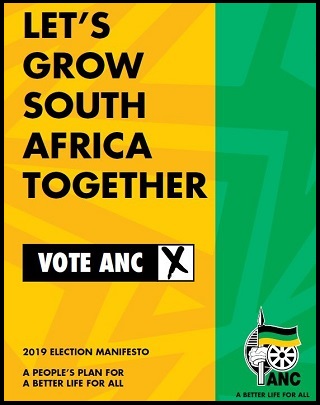Women of South Africa, Mbokodo,
On this Women’s Day, I greet you, the inheritors of the noble legacy of the women of 1956.
Sixty-four years ago, our mothers, daughters, sisters and grandmothers stood defiant and proud, united in their demand to live in freedom.
They stood not for themselves alone, but for the rights of the generations of women yet to come.
This day provides all of us with an opportunity to reflect on the road we have travelled since then.
As a country, we have much to be proud of.
We have made gains in advancing women’s rights, in broadening women’s access to education, in the provision of health care and social support to women, and in improving their participation in the economy and decision-making.
At the same time, we know that the lived reality for millions of South African women is very different to the promise contained in our Constitution.
We know that millions of South African women still live in conditions of poverty and unemployment. They face discrimination and violence.
To give effect to our commitment to the upliftment of women, South Africa has joined Generation Equality, a global campaign to achieve gender equality by 2030.
As part of this campaign, we are part of two Action Coalitions, one on economic justice and rights and another on gender-based violence and femicide.
These Action Coalitions mobilise governments, civil society and the private sector for collective action.
They give us an opportunity to work with other world leaders to achieve real change in the lives of women across the globe.
As we mark Women’s Day this year, South Africa is in the grip of two pandemics – the coronavirus pandemic and the scourge of gender-based violence and femicide.
Ever more women and children are being abused and losing their lives at the hands of men.
It cannot be that this Women’s Day is drenched in the tears of families who have lost their sisters, daughters and mothers to violence perpetrated by men.
This cannot continue.
We can no longer as a nation ignore the deafening cries of women and children for protection, for help and for justice.
It has been eleven months since I addressed a joint sitting of Parliament to announce an Emergency Response Action Plan to combat gender-based violence and Femicide.
Since then we have taken concrete actions to provide greater support and care to survivors of gender-based violence.
We have increased the number of shelters and care centres for survivors and improved the capacity of our police to deal with crimes of gender-based violence.
We have made important progress in reforming our laws to give greater protection to survivors of domestic and sexual violence.
We now also have a National Strategic Plan, which among other things aims to promote women’s economic inclusion.
One of the most important ways to reduce the vulnerability of women to gender-based violence is to enable them to become financially independent.
With the launch of Generation Equality and with the implementation of the National Strategic Plan we have a unique opportunity to refashion our society and the lives of the women of South Africa.
We have an opportunity to build a country in which women’s right to dignity, security, safety and protection is non-negotiable.
It requires bold and measurable actions by government, civil society, the private sector and all actors for meaningful change.
Today we commit to a new social compact with the women of this country informed by our collective commitment to gender equality.
This will be driven by bold actions.
The first action is to expand the access of women to economic opportunity.
We will do this, among other things, by setting aside 40% of public procurement for women-owned businesses.
We now expect national departments to monitor and report on how many women have participated in each public procurement process.
They will have to develop clear plans on how they will broaden women’s participation over the next 12 months.
As Chair of the African Union we will also be working on policy guidelines to help member states, on our continent, develop similar interventions.
The second action is to support women who operate small or micro businesses, including in the informal sector.
Lack of access to financial services and digital identification limits their ability to conduct business.
Under Generation Equality, we will be supporting AU member states in their drive to adopt digital IDs.
We will engage the financial sector to strengthen efforts to make financial services accessible and affordable for women in South Africa.
The third action is to speed up the process of giving women access to productive assets such as land.
We will ensure that our own land reform process favours all historically disadvantaged people – including women – in getting land and the means to farm it.
Of the R75 million in COVID-19 relief earmarked for farming input vouchers, 53% of the beneficiaries will be rural women.
We must ensure that women subsistence and small-scale farmers continue to receive support beyond the lockdown.
At the same time, we will be calling on AU member states to put policies in place to increase women’s ownership of land to 30%.
Our fourth action is to ensure that women are safe from gender-based violence in the workplace.
Through Generation Equality, we will work at a national and regional levels towards the ratification of the ILO Convention on Violence and Harassment in the Workplace.
The urgency of achieving gender equality has never been greater than now.
The coronavirus has left none of us untouched.
But it is those who already face economic insecurity, poverty, discrimination and exclusion who have been hardest hit.
To support the fight against gender-based violence, the Solidarity Fund has approved a R17 million project to expand sheltering services and support the network of Thuthuzela Care Centres.
A portion of this funding will also go towards capacitating the GBV Command Centre.
To ensure women are not made more vulnerable during the lockdown, we have put mechanisms in place not just for social support, but also to help women-owned businesses.
Of the 12.6 million people who received social grants during the month of June, 10.5 million or 83 percent were women aged 16 years and older.
As of this week about 1.4 million South African women have received the Special COVID-19 Social Relief of Distress grant.
The food parcels distributed through the Department of Social Development and the Solidarity Fund have reached just over 1 million families, among them women-headed households.
In the second round of food relief the Fund will distribute this month in the form of vouchers, some 40 to 50 percent of the target beneficiaries will be women.
COVID-19 relief is also being provided to women-owned SMMEs through our development finance institutions.
For example, of the total number of SMMEs benefiting from the Debt Relief Finance Scheme, 33% are women-owned businesses.
The Industrial Development Corporation has also directed a significant portion of its funding approvals to supporting youth and women-empowered businesses.
We have prioritised black-owned and women-owned businesses in the procurement of personal protective equipment.
There have been a number of success stories of women either starting businesses to produce personal protective equipment or modifying existing business operations.
We are deeply concerned about the corruption that has marred our national effort to make PPEs accessible to our hardworking health workers.
We expect the law enforcement agencies to find the culprits and ensure they face the full might of the law.
This pandemic has demonstrated our ability to support the greater economic participation of women in real terms.
This good work must not end when the pandemic is over.
We must maintain the momentum.
The generation of 1956 mobilised, organised and stood firm in their demands for their rights to be respected.
The women who in the recent past have taken to the streets demanding an end to gender-based violence and femicide carry forward the flame of that struggle.
Under Generation Equality, we want to see women’s full empowerment achieved by this generation, within a generation.
This is our responsibility as a nation.
If we each play our part, we can make this happen.
The time for talk is over. The time for action is now.
I wish all the women of South Africa a happy Women’s Day.
I thank you.




